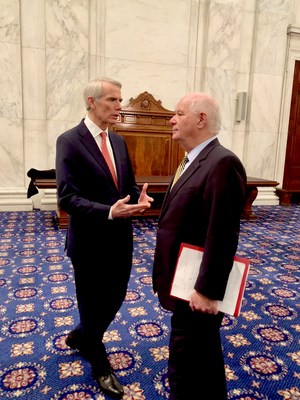

WASHINGTON, Dec. 18, 2018 /PRNewswire/ -- The New Markets Tax Credit (NMTC) Coalition held its Annual Conference on December 12 and 13 in Washington, D.C. The event featured members of Congress as keynote speakers, and panels on timely community development matters. Attendees were also provided with insights from the Treasury Department and the release of updated state statistics on NMTC efficacy.

NMTC Coalition President Kermit Billups opened the conference, welcoming speakers and guests. The experienced NMTC practitioner and Greenline Ventures EVP highlighted recent successes and looked to the future of the NMTC Coalition. Keynote speakers at the conference included U.S. Reps. Terri Sewell (D-Ala.) and Tom Reed (R-N.Y.). Both indicated their desire to work with House colleagues to see the NMTC not only extended, but made permanent and expanded.
"We have seen firsthand the impact the New Markets Tax Credit program has had here in New York and want to ensure it has a fair shot at continuing to boost jobs in our community," Congressman Reed said. "While the economy continues to grow, small businesses – the lifeblood of our economy – still struggle to secure the capital needed to spur revitalization."
"The New Markets Tax Credit helps create a better environment for businesses and transformative projects to thrive – boosting wages, services and economic development where it's needed most," Reed concluded.
A legislative outlook panel was led by moderator Bob Rapoza, NMTC Coalition spokesman, and included key congressional staff. Many attendees headed to congressional visits that afternoon, followed by a reception in the Kennedy Caucus Room where they were addressed by Senators Ben Cardin (D-Md.) and Rob Portman (R-Ohio), Senate NMTC Extension Act cosponsors and Senate Finance Committee members, who discussed NMTC impact and the future of tax policy.
Sen. Cardin said, "In Maryland, the New Markets Tax Credit has been deployed on a diverse range of infrastructure and community development efforts, from affordable housing, to health clinics, to community centers. Since 2003, the credit has resulted in billions of dollars in investment across the state and created over 34,000 jobs. It is time to make this incredibly valuable program permanent."
Senator Rob Portman added, "Pro-growth federal policies are helping grow our economy and strengthen our communities. More than ever, we need to continue support for programs like the New Markets Tax Credit that spur investment in areas that truly need it and help create new industry, infrastructure, and jobs for cities and towns across the U.S. that have felt left behind. I've seen the results that these tax credits can have on our communities. Last year in Ohio, $280 million in New Markets Tax Credit financing generated a total of $462 million in public-private project investment for 29 projects in the state. Our local communities depend on these tax incentives for projects that transform our communities, create jobs, and make a real difference in peoples' lives, and I'll continue fighting to make them permanent."
The final keynote of the conference came from Community Development Financial Institutions (CDFI) Fund Director Annie Donovan. At the close of her remarks, Donovan announced her departure from the CDFI Fund. During her five years as director, Donovan oversaw tremendous growth in the agency's funding and programming and the largest ever CDFI and NMTC program award rounds. Integrating more data into policy-making was a top priority for Donovan.
Panels during the conference also included NMTC board and leadership, economic development experts and Treasury Department professionals. Those discussions focused on Opportunity Zones, NMTC investor prospects, NMTC financing disaster relief, and the latest insights from the Treasury Department.
"Since its inception, the New Markets Tax Credit has financed more than 5,000 projects and created over one million jobs," said Bob Rapoza. "The conference provides practitioners with opportunities to discuss ways to build upon its success, helping low-income rural and urban communities access the capital necessary to grow local economies, expand business opportunities, update worn infrastructure, and make needed services like healthcare, education and childcare available to individuals and families living in distressed areas."
Contact: Ayrianne Parks
ayrianne@rapoza.org
(202) 393-5225

SOURCE New Markets Tax Credit Coalition
